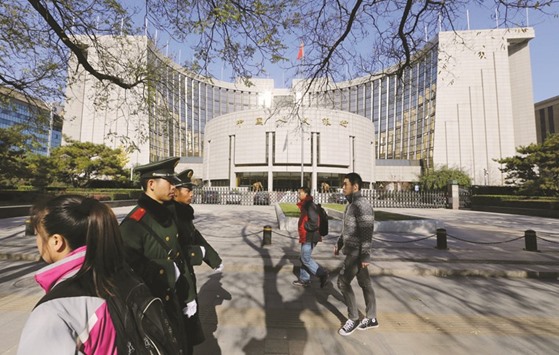China’s money-market rates are forecast to remain elevated in the coming quarter as the central bank seeks to rein in leverage that’s driven bonds to unprecedented levels and poses a risk to the financial system.
The overnight repurchase rate will average 2.18% in the coming three months, the highest in almost two years, according to a Bloomberg survey of fixed-income traders and analysts. That compares with 2.04% for the current quarter and yesterday’s fixing of 2.30%. The People’s Bank of China will continue using longer-term tenors in its open-market operations to drive up borrowing costs, said all but one of the survey’s 17 respondents, while a majority suggested a record rally in sovereign bonds will cool.
The benchmark seven-day repo rate climbed on Monday by the most since April, spurred by speculation that policymakers are trying to discourage investors from using borrowed cash to finance fixed-income investments. The nation’s sovereign bonds have handed investors returns in all but one of the last 11 quarters and the 10-year yield sank to an unprecedented 2.64% in August, leaving the securities at risk of being sold off as China’s economy shows some signs of improvement and the Federal Reserve prepares to raise interest rates.
“The central bank wants to start squeezing out any bubbles in financial markets and the real economy which were fueled by relatively cheap credit,” said Zhu Qibing, chief macro economy analyst at BOCI International (China) Ltd in Beijing. “The PBoC may intend to fine-tune monetary policy before the Fed raises rates at year-end. That’s why it chose to use longer-term contracts in open-market operations.”
The PBoC has in the past month resumed offerings of both 14- and 28-day reverse-repurchase agreements in some of its daily auctions, lending tools that carry higher interest rates than the more frequently used seven-day agreements. The move came about amid a surge in the use of overnight repo deals, which totaled a record 52.3tn yuan ($7.8tn) in August as the short-term lending tool was used to finance purchases of higher-yielding longer-term bonds. Ten of the survey’s respondents said they expect the PBOC to continue using seven-, 14- and 28-day reverse repos.
The overnight repo rate rose nine basis points to 2.30 percent as of 4:30pm in Shanghai, the highest since April 2015, while the one-week rate climbed to the highest level in more than a year, weighted average prices show.
Bonds have retreated from their highs, with the benchmark 10-year yield at 2.71% on Tuesday. It is forecast to be 2.70% at year-end, based on the median estimate in the Bloomberg survey conducted on September 22-26. Foreign central banks, monetary authorities and supranational organisations have recently increased their allocations of onshore yuan bonds, according to a statement posted on the PBOC’s official Weibo social media account Tuesday.
PBoC deputy governor Yi Gang said this month that the short-term goal is to curb leverage, a sign that keeping interest rates low is becoming less of a priority in the world’s second-largest economy. CLSA Ltd estimates total debt in China may reach 321% of gross domestic product in 2020 from 261% in the first half, while the Bank for International Settlements warned the credit-to-gross domestic product “gap” was at the highest level in data going back to 1995.
“We’re more cautious now than at the beginning of the year,” said Mo Qian, head of fixed income research at HFT Investment Management Co in Shanghai. “We don’t think the central bank will ease further. There are a lot of uncertainties in monetary policies, as the economic outlook is less pessimistic.”
The participants in the Bloomberg survey included Huishang Bank Corp, HFT Investment Management Co, Zhongrong Wealthin Asset Management Co, Hengfeng Bank, China Merchants Bank Co, and China Guangfa Bank Co. Eleven investors and analysts asked not to be identified as they are not allowed to comment on the matter publicly.

People walk past the headquarters of the People’s Bank of China as two paramilitary police officials patrol around it in Beijing. The Chinese central bank will continue using longer-term tenors in its open-market operations to drive up borrowing costs, said all but one of the survey’s 17 respondents, while a majority suggested a record rally in sovereign bonds will cool.
